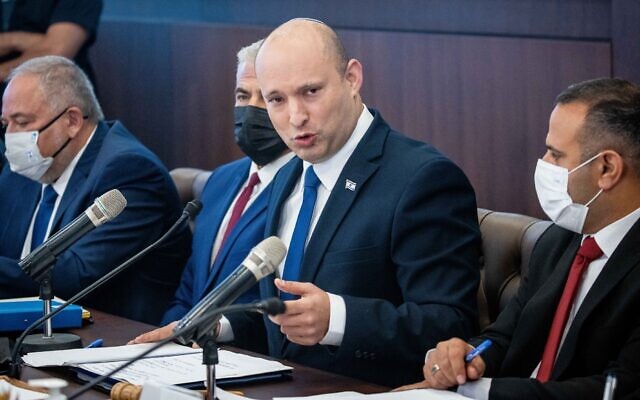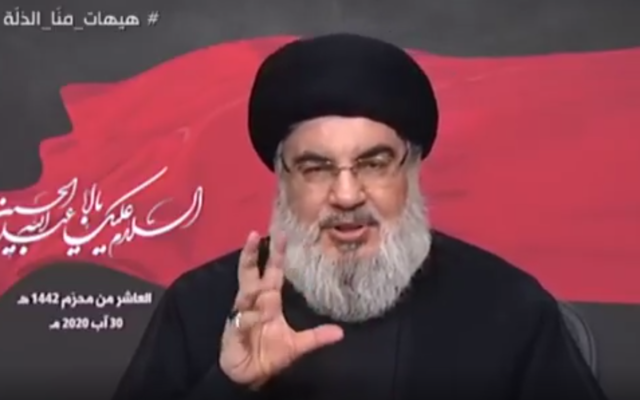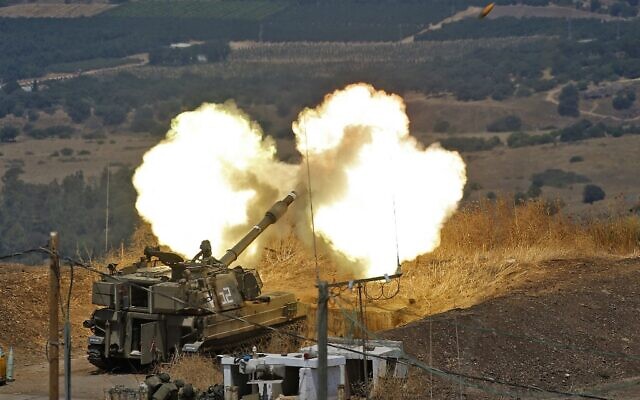Following rocket fire at Galilee claimed by Hezbollah, PM says Israel ‘will not abide fire on its territory,’ Beirut must clean up its ‘backyard’

Pointing the finger at Lebanon’s government after Hezbollah rocket fire hit northern Israel, Prime Minister Naftali Bennett said Sunday that the Lebanese government and army “must take responsibility for what is happening in their backyard.”
“It is less important to us whether it is a Palestinian organization or rogue factions. The State of Israel will not accept firing into its territory,” Bennett said at the start of the weekly cabinet meeting in Jerusalem.
“On the Lebanese front, there is a very important awakening of many citizens in the country against Hezbollah and the Iranian involvement in the country, which in [the midst of] the severe economic and political crisis there, are also embroiling them on the front with Israel,” he said, charging the Lebanese government with the responsibility to stop rocket fire into Israel.
On Saturday, Hezbollah Secretary-General Hassan Nasrallah said that his terror group did not seek escalation with Israel, but would respond to any Israeli airstrikes in southern Lebanon.
“We wanted to tell our Israeli enemy that any airstrike against Lebanon will absolutely be met with a response — but in an appropriate, proportional way,” he said.
Nasrallah made the remarks in a televised address celebrating Hezbollah’s self-described “victory” in the 2006 Second Lebanon War against Israel. The speech was scheduled before tensions escalated between Israel and the terror group along the Lebanese border earlier this week.

Israel struck targets in south Lebanon late Wednesday in response to what the Israel Defense Forces said was rocket fire by Palestinian terror groups in the area.
The next day, Hezbollah fired missiles toward open areas in the north of Israel, which responded with several rounds of artillery strikes. Witnesses reported artillery fire by Israeli forces on the Lebanese side of Shebaa Farms and outside the town of Kafr Shouba after the attack.
Hezbollah also released a video of the assault, showing a mobile rocket launcher maneuvering into position and firing a salvo of rockets at Israel.
Until Friday’s barrage, Hezbollah had not taken responsibility for rocket fire toward Israel since the 2006 war. Israel had not publicly conducted airstrikes in Lebanon since 2014, although Israeli planes are said to frequently enter Lebanese airspace.
“What happened over the past few days was a dangerous development, something that has not happened for 15 years,” Nasrallah said, waving away the 2014 airstrikes as a minor exception.
For now, Nasrallah said, Hezbollah is confining its response to open military zones on Mount Dov, which Lebanese see as occupied territory. Israel captured the area from Syria in the 1967 Six Day War.
Nasrallah claimed his terror group deliberately chose to fire rockets at Israel during the day so as to avoid “terrifying Israeli residents.” Nonetheless, several Israeli residents in northern Israel were treated by medics for anxiety attacks following the rocket fire.
But the Hezbollah chief added that if Israel continues to conduct airstrikes in Lebanon, Hezbollah may broaden its range of fire. He said that future Hezbollah retaliatory rockets could target “the Galilee or parts of the Lebanese Golan that Israel has occupied.”

Lebanon has been undergoing a spiraling economic and political crisis in recent months, with some observers warning the ever-fragile country could collapse entirely.
The Israeli army says that it hopes to contain the situation on the northern border without a major escalation. Military spokesperson Ran Kochav told reporters Friday that Israel has “no intention of going to war, but we do not want to turn the Lebanon border into a line of confrontation.”
Kochav argued that Hezbollah was already effectively deterred, as the terror group had only targeted open areas, rather than population centers.
Nasrallah, for his part, insisted Saturday that it was Israel that feared a broader conflict with Hezbollah, not the opposite. He claimed that Bennett had “seen with his own eyes the failure of the Israeli military institutions” during the 2006 conflict with Hezbollah. The premier has indeed voiced his frustrations over what he viewed was the ill-prepared nature of the IDF during the Second Lebanon War. However, Bennett has said that the army is in a far better state today.
As reported by The Times of Israel
